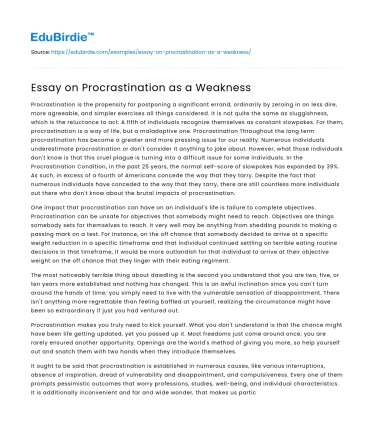Introduction
Procrastination is a phenomenon that affects individuals across various domains of life, manifesting as the intentional delay of tasks despite knowing the potential negative consequences. As an inherent human tendency, procrastination is often considered a significant weakness due to its impact on productivity, mental health, and the achievement of personal and professional goals. The habit of procrastination has been extensively analyzed in psychological literature, linking it to issues such as decreased performance, increased stress, and the erosion of self-discipline. This essay delves into the various dimensions of procrastination as a weakness, examining its underlying causes, implications, and strategies to overcome it. By exploring both theoretical perspectives and real-life examples, we aim to provide a comprehensive understanding of why procrastination persists as a detrimental behavior and how it can be effectively managed.
Psychological and Behavioral Underpinnings
The psychological and behavioral underpinnings of procrastination reveal a complex interplay of cognitive and emotional factors. A significant body of research attributes procrastination to self-regulation failure, where individuals struggle to control impulses and prioritize long-term rewards over immediate gratification (Steel, 2007). This self-regulation failure is compounded by cognitive distortions, such as overestimating the time available or underestimating the difficulty of tasks, leading to a false sense of security. According to Tice and Baumeister (1997), procrastination can also be viewed as an emotional regulation strategy, where individuals delay tasks to avoid negative emotions such as anxiety or fear of failure.
Save your time!
We can take care of your essay
- Proper editing and formatting
- Free revision, title page, and bibliography
- Flexible prices and money-back guarantee
Furthermore, procrastination is often linked to perfectionism, where individuals postpone tasks due to an irrational belief that their work must be flawless before it can be initiated. This perfectionist mindset can create a paralyzing effect, preventing individuals from starting tasks due to the fear of not meeting their own high standards. The interplay between procrastination and perfectionism is encapsulated in the work of Flett, Hewitt, and Martin (1995), who suggest that perfectionists are more susceptible to procrastination due to their intense fear of negative evaluation. These psychological and behavioral aspects underscore the complexity of procrastination as a weakness, highlighting the need for targeted interventions that address both cognitive biases and emotional regulation strategies.
Impact on Productivity and Well-being
The impact of procrastination on productivity and well-being is profound, affecting both personal and professional domains. In academic settings, procrastination has been linked to poorer performance and lower grades, as students who delay tasks often find themselves cramming at the last minute, leading to suboptimal learning outcomes (Rothblum, Solomon, & Murakami, 1986). In the workplace, procrastination can result in missed deadlines, decreased quality of work, and strained professional relationships, ultimately hindering career advancement. Employers often view procrastination as a lack of commitment and reliability, which can have long-term repercussions on an individual's reputation and job security.
Beyond its impact on productivity, procrastination also takes a toll on mental health and well-being. Chronic procrastinators often experience heightened levels of stress, anxiety, and guilt, as they grapple with the repercussions of their delayed actions. This emotional distress is further exacerbated by the negative feedback loop that procrastination creates, where the stress of unfinished tasks leads to further procrastination, perpetuating a cycle of avoidance and self-blame. According to a study by Sirois and Pychyl (2013), procrastination is associated with increased levels of stress and decreased well-being, underscoring its detrimental effects on mental health.
Strategies for Overcoming Procrastination
Given the significant negative implications of procrastination, developing effective strategies to overcome this behavior is crucial. One widely recommended approach is time management, which involves setting clear goals, prioritizing tasks, and breaking large projects into manageable parts. This method helps individuals focus on specific actions and reduce the overwhelming nature of tasks, facilitating progress and completion. Cognitive-behavioral techniques, such as restructuring cognitive distortions and challenging perfectionist beliefs, can also be effective in addressing the underlying cognitive biases that fuel procrastination. By altering the thought patterns that contribute to procrastination, individuals can develop healthier, more productive behaviors.
Moreover, cultivating a growth mindset, as proposed by Dweck (2006), can empower individuals to view challenges as opportunities for learning rather than threats to their competence. This mindset shift can reduce the fear of failure and encourage individuals to take proactive steps towards goal achievement. Additionally, seeking social support from peers, mentors, or therapists can provide accountability and encouragement, helping individuals stay motivated and focused. By implementing these strategies, individuals can mitigate the impact of procrastination and enhance their productivity and well-being.
Conclusion
In conclusion, procrastination is a multifaceted weakness that stems from a combination of psychological, behavioral, and emotional factors. Its impact on productivity and well-being is significant, affecting both personal and professional spheres. By understanding the underlying causes of procrastination and implementing targeted strategies, individuals can overcome this detrimental behavior and improve their quality of life. While procrastination may be a common challenge, it is not insurmountable. Through self-awareness, time management, cognitive restructuring, and social support, individuals can break free from the cycle of procrastination and achieve their goals. As we continue to explore the intricacies of procrastination, it is imperative to develop comprehensive interventions that address its root causes and promote lasting change.






 Stuck on your essay?
Stuck on your essay?

